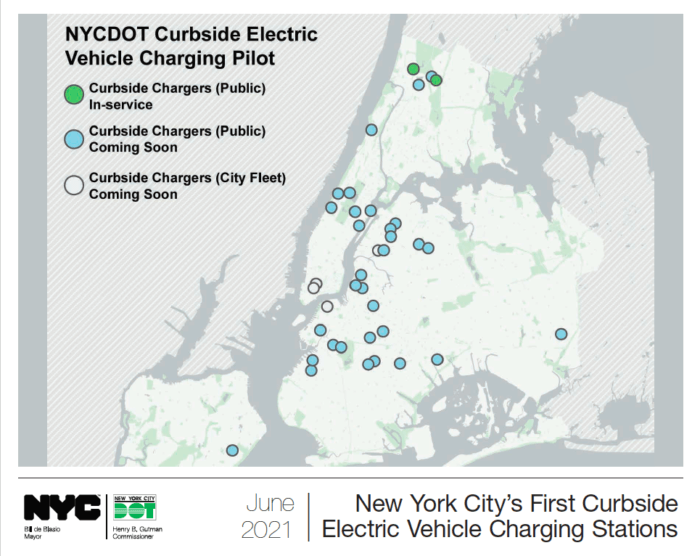Sign up for our PoliticsNY newsletter for the latest coverage and to stay informed about the 2021 elections in your district and across NYC
Although a new pilot to install more than 100 curbside charging ports citywide by October was unveiled in the Bronx last month, only 12 of those ports will eventually make it into the borough.
The pilot, which is spearheaded by the NYC Department of Transportation (DOT), Con Edison and FLO, an electric vehicle company, will bring 100 curbside Level 2 public charging ports to more than 20 neighborhoods across the five boroughs; 20 ports will also be installed for city fleet.
A ribbon cutting ceremony took place at the new two-port charger at the corner of Putnam Place and East Gun Hill Road on June 24. Another charging station was activated the same day with four ports, just 1.6 miles away at the intersection of Broadway and 240th Street

The two public curbside stations, tucked just south of Van Cortlandt Park, are the first of its kind to be installed in NYC.
The 12 ports in the Bronx will be dispersed across four locations; 34 locations are planned throughout the city. But all four Bronx locations are concentrated within less than 0.5-square mile, in and around the Norwood section. The Bronx is nearly 41.5 square miles.
Democratic City Councilman Eric Dinowitz, of District 11, believes the first curbside chargers being installed in the Bronx serves as “recognition” for the borough.
“I think there is more and more of a recognition that the Bronx often gets left behind when it comes to climate justice, infrastructure improvements, and so now, with more charging stations coming to the Bronx, residents can make the choice to purchase electric vehicles,” he said.
The Bronx will also get two ports at the intersection of Dekalb Avenue and East Gun Hill Road, and four ports at the intersection of Bedford Park Boulevard and Goulden Avenue.
Each charging location in the pilot can have between two and six ports, DOT spokeswoman Alana Morales said.
“My hope is that chargers become ubiquitous and that they exist not just on a handful of some street corners, but in all parking garages, the parking lots in our schools, hospitals, community centers,” Dinowitz said, “and so it becomes truly feasible for residents who don’t live in a house that don’t have access to their own charger to purchase an electric vehicle.”
But the lawmaker admits the pilot will not serve the whole borough.
“Let’s put it this way, I don’t think someone from Mott Haven or Hunts Point is going to drive to Norwood to find street parking to charge their electric vehicle, but this will benefit the residents of Norwood and the North Bronx who again are interested in purchasing an electric vehicle but previously did not have a place to charge their vehicle,” he said.
Dinowitz added that he knows a resident who charges their electric vehicle out of a third-floor window because of the lack of infrastructure.
Although Morales didn’t think there was a reason the Bronx was chosen for the first installation of the pilot, the charger locations were selected based on projected demand for charging, geographic diversity and input from local elected officials and community stakeholders, according to DOT.
Most of the chargers in NYC are in private parking garages in Manhattan, so the city prioritized neighborhoods outside the borough to encourage wider electric vehicle adoption, Morales said. Making more chargers accessible is part of an effort to meet the city’s climate goals of carbon neutrality by 2050, she added.
Out of 76,329 electric vehicles registered in New York State as of July 1, 16,045 are in NYC. According to New York State Energy Research and Development Authority (NYSERDA) data, of those electric vehicles only 856 — little more than 5% — are registered in the Bronx compared to 5,273 in Queens, 4,524 in Manhattan, 3,918 in Brooklyn and 1,474 in Staten Island.
The Bronx is the borough with the highest unemployment rate in the city as of April, but the DOT says the cost of electric vehicles are going down. By using federal tax incentives, drivers can choose between more than 30 models that have 200 miles per charge for under $30,000, according to DOT.
The pilot charging stations cost $2.50 per hour from 7 a.m. to 7 p.m., and $1 per hour overnight. A daytime charge is equivalent to the price of fueling at a gas station and overnight charging may be more than 60% cheaper, according to DOT. The Level 2 Chargers fully charge electric vehicles in about four to eight hours, depending on the vehicle’s battery size. Each port reserves a street parking spot for electric vehicles.
Aliya Schneider is a contributor for the Bronx Times.
